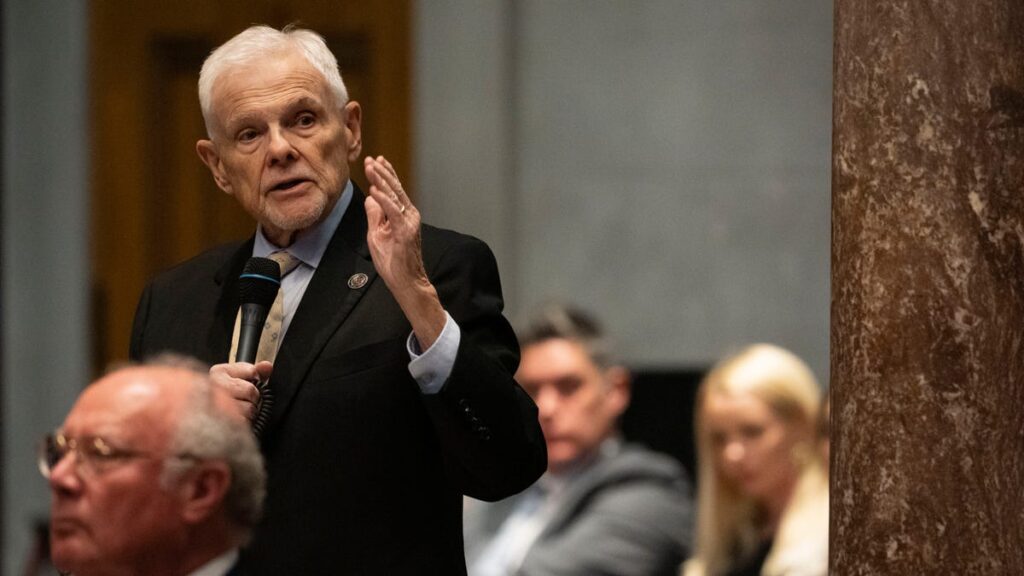
Protestors for immigrant and refugee rights crowd Tennessee Capitol
A bill that would require local public schools to collect evidence of citizenship or legal residency status passed a Senate committee. The bill could allow districts to charge tuition for students who are not in the nation legally.
- Critics of the bill have called it a “legislative weapon for big tobacco to crush competition.”
- Sponsor Sen. Ken Yager, R-Kingston, says the bill is aimed at “stopping the influx of Chinese vape products that are addicting our children and wreaking havoc on our schools.”
- The bill’s House and Senate sponsors have both received thousands in campaign contributions from the PAC of a leading cigarette manufacturer.
- Currently only 34 vape products, all connected with big tobacco companies, have been approved by the FDA.
A bill that would impose a state tax of up to 10% on vape products – a higher rate than tobacco – and effectively ban sale of many vape products in the state by requiring application for FDA approval before products are sold is headed for a final Senate vote this week.
Senate Bill 763 – which has been criticized by opponents as a “legislative weapon for big tobacco to crush competition” – has passed the Senate Finance Committee in a 9-2 vote, and a counterpart House panel with bipartisan support.
Sponsors of the bill, and many lawmakers who have voted for it so far, have received thousands in campaign contributions from a political action committee of major U.S. cigarette manufacturers like Camel and Newport.
Senate sponsor Ken Yager, R-Kingston, said the bill is aimed at stoppiong “the influx of Chinese vape products that are addicting our children and wreaking havoc on our schools” ― not an attack on Tennessee’s vape industry.
“I don’t take my orders from big tobacco,” Yager told reporters Thursday.
But the bill goes far beyond cracking down on age verification requirements for vape product sales.
Bill would effectively outlaw certain vape products
If signed into law, the bill would ban the sale of vapor products including hundreds of disposable and flavored products in Tennessee that are not approved or in the process of being approved by the U.S. Food and Drug Administration.
Testifying in committee, David Nelson, who owns five vape stores in upper East Tennessee said limiting sales only to FDA approved products could be a step back for people trying to quit smoking.
“These tobacco and menthol-only products fail to meet the needs of the 15 million current adult vapers, 83% of whom prefer sweeter, fruity flavors to stay off cigarettes,” Nelson said.
Currently just 34 vapor products have been approved by the FDA, and all are tied to big tobacco companies. Most vape products sold in the U.S. are imported from China. If passed, the bill would fine vape retailers of $500 to $1,500 per product illegally sold.
“Big tobacco is panicking as smoking declines and their inferior products aren’t selling,” Nelson said. “This bill ensures their monopoly by eliminating competition under the guise of regulation.”
Studies have shown that vape products like e-cigarettes with nicotine can help adults stop smoking, but their long-term health impacts remain unknown. The FDA has not approved any e-cigarette products to help people stop smoking.
“We are not at all advocating the closure of any vape stores,” Yager said. “There’s plenty of business without having to resort to illicit products.”
Yager said the bill seeks to reduce “products made from illicit material imported from communist China,” and would simply “setting up guardrails to make sure that the practices in these stores do not in any way harm the lives of young people.”
Sponsors and supporters have taken thousands from tobacco PAC
Yager and House sponsor Rep. David Hawk, R-Greeneville, are both longtime recipients of campaign contributions from the Reynolds American PAC, fueled by manufacturers of the country’s best-selling cigarette brands including Newport, Camel, Pall Mall and Lucky Strike.
Yager and his PAC have accepted $13,500 in contributions from Reynolds American since 2010. Hawk has accepted $3,750 from the PAC.
“Let me be very clear: I don’t trade my vote in this body for a contribution,” Yager said Thursday. “I have never discussed an issue with anyone who’s given me a contribution.”
Tennessee Reynolds American PAC has contributed more than $443,000 to state candidates since 2010, including the following Senators who have all voted for the bill in committee:
- Sen. Paul Bailey, R-Sparta − $4,000
- Sen. Ferrell Haile, R-Gallatin − $500
- Sen. Joey Hensley, R-Hohenwald − $1,000
- Senate Majority Leader Jack Johnson, R-Franklin − $11,500
- Sen. Bill Powers, R-Clarksville − $1,000
- Sen. Shane Reeves, R-Murfreesboro − $1,250
- Sen. Paul Rose, R-Covington − $1,000
- Sen. John Stevens, R-Huntington − $2,000
- Sen. Brent Taylor, R-Memphis − $2,000
- Sen. Bo Watson, R-Hixson − $4,500
Yager has taken more in campaign contributions from Reynolds American than any other senator except Lt. Gov. Randy McNally, R-Oak Ridge, whose political action committee has received $45,000 from the PAC since 2010.
“I don’t know whether I’ve received a donation from them. If you look at my voting history, I’ve voted against tobacco, marijuana, and also these vaping products and will continue to vote against them, whether they give me money or not,” McNally said Thursday.
Vape products would be taxed more than tobacco
Tennessee is one of about 20 states that does not currently levy a tax on vape products.
If passed, the bill would impose a 10% tax on open system vape products, and a 7% tax on closed system vape products. Tennessee taxes tobacco products at 6.6%. Yager told reporters on Thursday his proposed tax on vape products “is really no different from the tax on other nicotine products.”
On Wednesday, Hawk called the tax a “user fee.”
“It is not a general tax on all citizens, but a user fee on these products, so that the adults who use them are the ones paying for them to be regulated,” Hawk said Wednesday. “It’s a small price to pay for what we’re hoping will stop the influx of Chinese vape products into our communities and poisoning our children.”
Revenue collected ― expected to come to $16.5 million ― will go to the state’s general fund, less the cost of administration and enforcement.
21% of Tennessee high schoolers vape
State law already bans sale of any vape products to consumers under the age of 21.
Still, vaping is a serious issue among Tennessee high schoolers. State analysts estimate about 400,000 people in Tennessee regularly use vaping devices, including about 21% of Tennessee high school students, according to data from the Tennessee Department of Education.
The bill would require government issued photo ID for sale of vape products requirements – making the standard for vape products the same as alcohol and tobacco.
Scott County Juvenile Judge Scarlett Ellis wrote in a letter to Yager that youth vaping is “the biggest issue I face as a juvenile judge.”
“One student shared with me ‘about 10 minutes after vaping for the first time in the bathroom I started getting dizzy, my vision was narrowing, and I felt like I was going to die as I held to the wall so I could get to the principal’s office for help,’” Ellis wrote. “One mother shared ‘my daughter woke me up while she was swaying side to side about to pass out, she was shaking all over and then started convulsing.”
About 30% of youth who come before Ellis’ court and consent to a drug test have tested positive for THC – the psychoactive compound found in the cannabis plant.
“Our juvenile courts across Tennessee are being flooded with minors who are victims of… illegal Chinese vape products,” Yager said. “Elementary and middle school students that are buying vaping products at these stores, are coming to school spaced out – nauseated – with other physical problems that have been wrought by the use of this – and illegally so.”
State board recommended different approach
A state review board has recommended some aspects of the bill – like universal carding – but the bill does not follow other recommendations.
The Tennessee Advisory Commission on Intergovernmental Relations earlier this year said the state should require licensing for vapor retailers, establish universal carding, increase funding for smoking cessation efforts, and require school districts to report more data on students’ substance use and abuse.
Sen. Jeff Yarbro, D-Nashville, argued the state should follow those recommendations and require safety standards from “people who actually control the access” to vapor products – not regulate the products themselves.
“There’s no question that we do have significant youth vaping issues,” Yarbro said. “The problem that I see is the one of access. … I think we do need to tax this. I do think that we should have serious ID requirements. I really think that funds from this ought to go to smoking cessation programs.”
Yager responded he feels his idea will be “a more effective approach.”
Vivian Jones covers state government and politics for The Tennessean. Reach her at vjones@tennessean.com.
Want to share your thoughts with the legislators that represent you? Find your state Senator and Representative and their contact information on the Tennessee General Assembly website here.
This article was originally published by a www.tennessean.com . Read the Original article here. .

